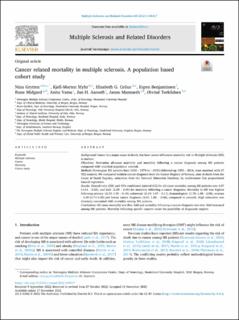Cancer related mortality in multiple sclerosis. A population based cohort study
Grytten, Nina; Myhr, Kjell-Morten; Celius, Elisabeth Gulowsen; Benjaminsen, Espen; Midgard, Rune; Vatne, Anita; Aarseth, Jan Harald; Mannseth, Janne; Torkildsen, Øivind Fredvik Grytten
Journal article, Peer reviewed
Published version

Åpne
Permanent lenke
https://hdl.handle.net/11250/3048666Utgivelsesdato
2023Metadata
Vis full innførselSamlinger
- Department of Clinical Medicine [2066]
- Registrations from Cristin [9791]
Originalversjon
Multiple Sclerosis and Related Disorders. 2022, 69, 104417. 10.1016/j.msard.2022.104417Sammendrag
Background: Cancer is a major cause of death, but how cancer influences mortality risk in Multiple Sclerosis (MS) is unclear.
Objectives: Determine all-cause mortality and mortality following a cancer diagnosis among MS patients compared with matched population controls.
Methods: Norwegian MS patients born 1930 - 1979 (n= 6950) followed-up 1953 – 2016, were matched with 37 922 controls. We compared incident cancer diagnosis from the Cancer Registry of Norway, date of death from the Cause of Death Registry, education from the National Education Database, by multivariate Cox proportional hazard regression.
Results: Hazard ratio (HR) and 95% confidence interval (CI) for all-cause mortality among MS patients was 4.97 (4.64 – 5.33), and 2.61 (2.29 – 2.98) for mortality following a cancer diagnosis. Mortality in MS was highest following urinary- (2.53: 1.55 – 4.14), colorectal- (2.14: 1.47 – 3.11), hematological- (1.76: 1.08 – 2.88), ovarian - 2.30 (1.73-3.06) and breast cancer diagnosis (2.61: 1.85 – 3.68), compared to controls. High education was inversely associated with mortality among MS patients.
Conclusions: All-cause mortality was five- fold and mortality following a cancer diagnosis was two- fold increased among MS patients. Mortality following specific cancers raises the possibility of diagnostic neglect.
